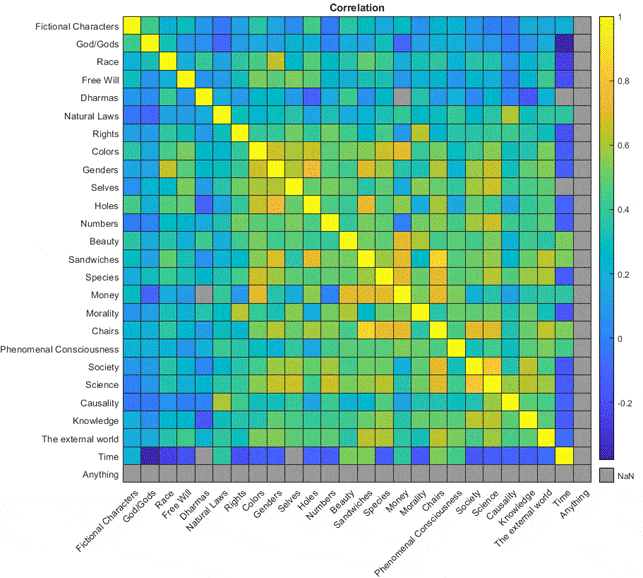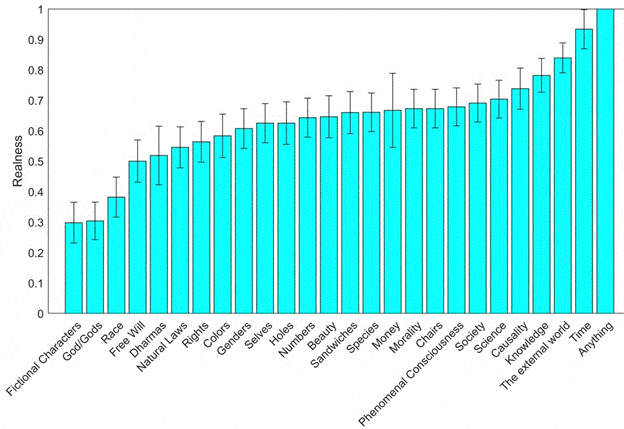Much of skepticism boils down to trying to show if something is real or not. Cryptids? Not real. Climate change? Real. Homeopathy? Not real. Aliens? Probably real, but unlikely to traverse galaxies just to play tag with the Airforce and harass some farmers.
However, we rarely stop and unpack what we mean by “real”, taking it as obvious in context. Naturally, I couldn’t leave that fact well enough alone, so I developed a form of consensual recreational torture I call The Enlightening Round. At the end of every Embrace the Void podcast, I present my guest with a list of things and force them to tell me if each thing is real or not real.
To be clear, the stakes could not be lower. The guests are not allowed to define what they mean by “real”, which leaves them endless room for hedging after the fact. Despite these very low stakes, guests consistently express a great deal of anxiety at giving the answer they believe is correct and believe signals the right commitments to listeners. Here is the current list, if you’d like to test yourself at home. Notice your mental and emotional states as you move through the list:
- Is anything real?
- The External World?
- Colors
- Phemomenal consciousness
- Free will
- Selves/persons
- Genders
- Races
- Species
- Morality
- Rights
- Knowledge
- God/Gods
- Society
- Money
- Numbers
- Fictional characters
- Holes
- Chairs
- Sandwiches
- Science
- Natural Laws
- Beauty
- Love
- Causality
- Time
Some readers will find this relatively easy, and I suspect the majority of folks who find it relatively easy will say the majority of the things are real. These lucky souls have likely not spent much time around philosophers and similar academics, and should keep that up if they know what’s good for them.
Why is this so painful for the rest of us? Especially for folks who spend a lot of time thinking about what’s real? The answer, I believe, is that we’re rarely asked to think about the reality of more than a small cluster of these concepts at a time, and we’re basically never asked to try to give a consistent account of realness that effectively encompasses all of them. That obscures the fact that it’s extremely difficult to define ‘real’, driving many a guest to rail at the very notion of real simpliciter and demanding they be allowed to make clear in what sense certain things are real. It’s all in good fun, but the angst is quite real.
A friend of the show, Jeremiah Traeger, has actually compiled hard data on guests’ answers and the resulting correlations between concepts. Here’s some trolling masquerading as science:


The first chart conveys the correlation between answers of real or not real on any two concepts. For example, the most powerful non-trivial correlation was between ‘sandwiches’ and ‘chairs’, with a correlation of ~0.85, where 1 would equal a perfect correlation and convey that every guest who says chairs are real also says sandwiches are real or vice versa. The second chart lays out how frequently a guest has said that a particular thing is real, with it being most likely they will say that “anything” is real, and least likely they say that fictional characters are real. The sample size at this point is around 60 guests.
The torturous nature of The Enlightening Round is made more acute by the strategic organizing of the concepts in question. While not part of the original test, I’ve started to open the enlightening round by asking if anything is real, as a way to prime the guest against cheap talk that ends up claiming nothing is real. At the time of our last data compilation no guest had said that nothing is real, though we have since had one guest choose that solution to try to avoid this philosophical Kobayashi Maru.
From the primer question, I move to the external world, which feels easy for folks until it’s followed by colors, a notoriously difficult to categorize set of secondary properties. Interestingly, many guests say colors aren’t real but both the external world and phenomenal consciousness are real, which makes one wonder how all the components of color can be real while color itself is not. I suspect this is indicative of folks seeing “simple” processes, processes they see as existing entirely in the external or internal world, as real, while seeing complex or intersubjective processes and their products as not real.
In my mind, free will and selves are fundamentally inseparable. I believe you can’t have free will without selves/persons. That view is clearly not universal though. As the second chart shows, some portion of folks see selves as real while denying those selves free will. This of course raises the issue that the definition of ‘real’ isn’t the only factor in play here, as guests are likely often working with radically different definitions of each of these concepts.
Gender, race, and species form the next cluster, as they’re all categories for groups of entities where there is substantial debate how much they are socially constructed. My sense is that the variation in responses on these three suggests that guests likely tend to see species as the least socially constructed, followed by gender and finally race. This is not to say that all guests associate social construction with anti-realness, only that some do and I suspect that explains the variation for these concepts.
The remainder of the concepts are more of a grab bag, with pairings like morality and rights or society and money producing stumbling blocks along the way. On advice from my numbers guy, I’ve kept in fictional characters as a kind of baseline test, and because it’s deeply amusing to see how many folks say fictional characters are real but god/gods is not. Folks sometimes wonder what the point is of asking about both sandwiches and chairs, especially when they appear so strongly correlated in guests’ minds. To me, ‘sandwiches’ is about whether taxonomies are real, and chairs is about whether complex objects exist or are all really just “processes arranged chair wise”. Each of these of course ties into metaphysical questions that philosophers will probably wrestle with for as long as we still exist.
Naturally, folks often ask me how I would answer the challenge, and I’ve been subjected to versions of the enlightening round on other podcasts. If forced to give one universal definition of ‘real’, I side with Philip K. Dick in defining ‘real’ as anything that doesn’t go away, no matter how hard you stop believing in it. I think this accurately conveys what folks actually mean when they use the term ‘real’, while avoiding slipping into assumptions about the nature of ‘real’ things and why they don’t go away even when you stop believing in them. It gives a straightforward explanation of the material world studied by the natural sciences, while also allowing that hallucinations, like the ones PKD himself experienced, are also real as long as they persist even when the person ceases to believe in them.
While I find this definition valuable, I’ve noticed that I also sometimes think of ‘real’ as less of a discrete property and more of a corrective to the ways people think about the world. For example, I frequently argue that morality is real. When I make those arguments, I mean ‘real’ in the sense above, but I also choose to emphasize the realist side of the argument because, in my experience, people tend to see morality as “not real” in ways that seem harmful to me. Even if it turned out to be true that moral realism and moral anti-realism blend into each other when you get far enough into the weeds, I think it is valuable to emphasize the realist interpretation as long as it feels like we as society are leaning too far in the other direction.
So, after enough procrastination and affording myself the freedom I deny my guests, the freedom to define their terms, here are my current answers to the enlightening round. They’re probably all wrong, but they’re my wrong. Before you throw shade, see if you can get through it yourself without regretting your decisions:
- Is anything real? Yes
- The External world? Real
- Colors Real
- Phemomenal consciousness Real
- Free will Not Real
- Selves/Persons Not Real
- Genders Not Real
- Races Not Real
- Species Not Real
- Morality Real
- Rights Real
- Knowledge Real
- God/Gods Not Real
- Society Not Real
- Money Not Real
- Numbers Real
- Fictional characters Not Real
- Holes Not Real
- Chairs Not Real
- Sandwiches Not Real
- Science Not Real
- Natural Laws Real
- Beauty Real
- Love Real
- Causality Not Real
- Time Not Real



